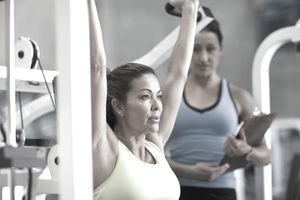
If you want to become a New Jersey personal trainer, there are several important factors you need to know before you apply. These factors include the average salary, education requirements, and employers. These factors will help you determine if the job is right for you. Learn more about the job duties, responsibilities and benefits of a New Jersey personal training instructor.
Average salary of a personal trainer in New Jersey
Personal training is an ideal career for someone who is passionate about health and fitness. This career is rewarding and can be lucrative. Personal trainers teach clients nutrition and fitness in gyms and health club. They inspire clients to reach their fitness goals.
New Jersey has many opportunities to be a personal trainee. The state ranks 46th when it comes to fitness access. However the obesity rate in New Jersey is very low. This means that there are plenty of opportunities for qualified fitness professionals. Because of this, the average personal trainer in New Jersey can expect to have a mix of moderately fit clients with modest goals. Additionally, a significant portion of the market will be made up of clients who are more image conscious.

New Jersey personal trainers can expect to make $68,437 an year. This is significantly higher than the $69k184 national average. However, where you live and how much experience you have will affect the amount of your salary.
New Jersey's education requirements for personal trainers
It is important to know the strict requirements of New Jersey's licensing laws if you are interested in becoming a personal coach. To be able to practice in the state, you will need to have your certification from a nationally recognized agency. You can earn your certification from a local school or take online courses.
A formal education and certification program is the first step to becoming a certified personal training professional in New Jersey. There are many programs with different levels and certifications to choose from. Some offer hands on workshops that can last several days or weeks. Other programs are self-paced, and can be completed remotely. New Jersey's job listings provide valuable insight.
If you're looking to become a personal trainer in New Jersey, it is best to choose a larger city. Newark, for example, has a large population, which translates into more potential clients. Also, more populous cities are more likely to open their arms to new businesses.

New Jersey Personal trainers: Employers
Personal trainers are a rewarding career option for those who want to help people achieve better health and fitness. This type of job often requires national certification. As a personal trainer, you'll provide motivation and guidance to your clients as they work toward their fitness goals.
New Jersey's personal trainers are highly respected and make some of the most lucrative salaries in the business. Many of these trainers work in high-energy gyms, spas, and hospitals, as well as independent businesses and wealthy clients' homes and studios. According to New Jersey employers, personal trainers earn between $44,893 and $74,347 as an entry-level wage.
A few things to remember before you apply for a job at New Jersey Personal Trainer. You must first have the right education. It is necessary to have a minimum high school diploma and basic certifications in life support from the American Heart Association.
FAQ
Exercise can I make my body gain weight?
Not at all. Exercising can help you maintain your current weight. When you work out regularly, you'll build muscles and increase your metabolism, helping you burn more calories throughout the day. This means you won't store as much fat in your body.
Can I have alcohol at work?
Drinking alcohol is high in calories so it's best to not consume too much while working out. It is possible to increase your endurance by drinking moderate amounts of alcohol (one glass per day). It can also help reduce fatigue and muscle pains caused by intense exercise.
Which Is more important? Exercise, diet, sleep?
This depends on what you're trying to achieve. Weight loss is possible by following a healthy diet. If you are looking to build muscle mass, however, exercise is the best option. Sleep is the last important factor, as it has little to do with how well your day goes.
What happens if my sleep is not enough?
You can't get enough sleep and your brain will not be able to regulate hormones and chemicals responsible for controlling appetite and metabolism. As a result, your body may become more hungry and can gain weight. Insufficient sleep can lead to stress, which can cause overeating.
Is it possible to look too thin?
Yes! Both eating disorders and underweight are unhealthy. It isn't normal to be smaller than your recommended height. It is possible to feel tired, weak or dizzy and may experience other signs that you are underweight.
What is Resistance Training?
Resistance training involves using weights or other objects to perform specific movements. For example, lifting weights strengthens your arms, shoulders, chest, back, legs, and core. Resistance training builds muscle mass, increases bone density, and promotes greater overall strength.
Statistics
- Globally, 81% of adolescents aged 11-17 years were insufficiently physically active in 2016. (who.int)
- According to the Centers for Disease Control and Prevention, chronic diseases cause 7 out of 10 deaths in the U.S., and treating chronic diseases accounts for 86% of U.S. healthcare costs. (mana.md)
- One study showed that adults who watch more than 4 hours of television daily had an 80% higher risk of death from cardiovascular disease. (heart.org)
- An estimated 110,000 deaths per year could be prevented (cdc.gov)
External Links
How To
How to keep fit while pregnant
Your body goes through many changes when you get pregnant. You experience a slowing of your metabolism and a decrease in food intake as you grow a child inside. Lack of sleep could make you feel sick. You can still enjoy this time of life, but you can stay healthy.
Before starting any exercise regimen, it's important to check with your doctor. They can advise you on which exercises you should avoid, and which ones are safe. A second thing to do is eat well during pregnancy. This includes eating plenty of protein, fiber, and iron. Third, you should drink lots of fluids. Water is particularly important when exercising, as sweat can lead to a loss of fluids. Finally, take care of your feet. Your feet should be dry all the time and you should wear shoes that support your feet. Morning sickness can be caused by eating small amounts of bread or crackers before you get out of bed. You might end up feeling nauseated.
-
Healthy eating is key. A healthy diet is crucial throughout the entire pregnancy.
-
Keep active. Daily exercise of at least 30 mins
-
Maintain a Healthy Weight. Losing weight can be achieved by eating smaller meals and snacking more often.
-
Get enough rest. Get at least 7-9 hours sleep each night.
-
Manage Stress. Learn relaxation techniques.
-
Avoid Alcohol. It may lead to miscarriage and birth defects.
-
Be gentle with your self. Do not try to push yourself too hard.
-
Take Care of Yourself. You can have someone look in on you if necessary.
-
Relax. Do things that bring you joy.